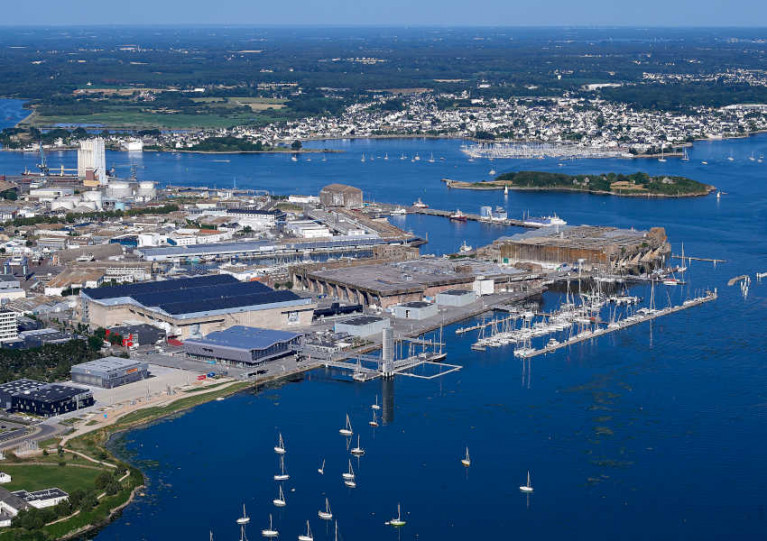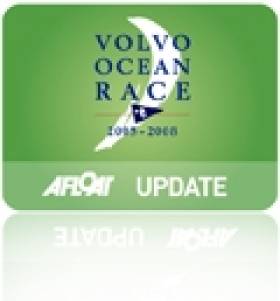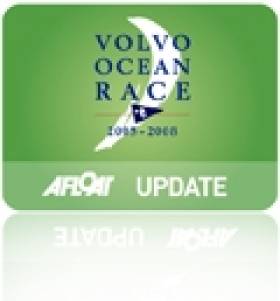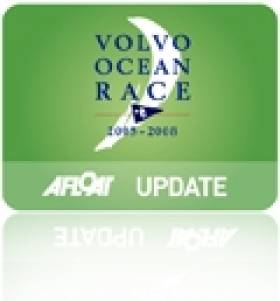Displaying items by tag: Lorient
Lorient to Host Start of The Ocean Race Europe
The French town of Lorient in Brittany has been chosen as the starting point for The Ocean Race Europe.
The iconic port, in the heart of the renowned Bretagne Sailing Valley, will host the start for both the IMOCA and VO65 fleets as they charge south across the Bay of Biscay.
This will mark the first racing under The Ocean Race banner for the high-tech IMOCA class boats and the one-design VO65 class.
For the teams, The Ocean Race Europe will be the first step on the journey towards the 2022-23 edition of The Ocean Race round-the-world event — and for some IMOCA teams for the Vendee Globe 2024 as well.
“Lorient has been an important part of the history of The Ocean Race, as a much-loved stopover port in 2011-12 and 2014-15,” said Johan Salen, managing director of The Ocean Race.
“Now Lorient becomes the starting port for a new, Europe-oriented event, and a fresh, exciting story begins. We are racing from the heart of what we call the French Sailing Valley and into the heart of Europe, providing a platform for extraordinary sport and driving change towards a healthier planet along the way.”
The Ocean Race Europe brings together the top international sailors and teams from the two classes that compete in the next around the world race, the VO65s and the IMOCA 60s.
The two fleets will race in a fully crewed configuration in stages between iconic European cities, from the Atlantic Ocean to the Mediterranean Sea and a finish in Genoa, Italy in the third week of June.
Lorient will host the start over the last weekend in May. As the home port for many IMOCAs, Lorient La Base is well positioned to welcome the race boats and teams ahead of the start of The Ocean Race Europe.
“Lorient La Base is proud to host the start of The Ocean Race Europe. With almost 50 local companies related to offshore sailing, Lorient Agglomération is a European renowned territory of nautical excellence,” said Fabrice Loher, the president of the Lorient Agglomération and Mayor of Lorient.
“Lorient La Base has all the advantages of a consolidated ecosystem to support the greatest sailing teams. This is why the top skippers chose Lorient La Base as their home port.
“The start of The Ocean Race Europe is a new step to consolidate the reputation of the city as a host port for amazing offshore sailing races.”
The fleets will assemble in Lorient ahead of the start from Friday 28 May.
Prior to arriving in Brittany, the VO65 fleet will participate in The Ocean Race Europe Prologue event, beginning in the Baltic Sea in early May and winding south before gathering at Lorient La Base at the end of the month, alongside the IMOCA fleet.
Organisers of The Ocean Race Europe are prioritising the health and safety of all competitors and stakeholders and will follow all relevant regulations and advisories with respect to COVID-19.
#vorinjury – A woman has been seriously injured close to the starting area for Leg 9 of the Volvo Ocean Race earlier today in Lorient, France The woman is currently receiving treatment at a hospital in Lorient following an incident on the water involving a trimaran (not related to the Volvo Ocean Race) and a Volvo Ocean Race marshal rib.
The crash happened at 1615 local time (0015 AEST), marring the start of the 960-nautical mile race to Gothenburg in Sweden, via a 24-hour stopover in The Hague.
A trimaran crashed with an organiser's inflatable boat with four people aboard.
A woman suffered a serious leg injury, according to the maritime police in Brest, and was evacuated by helicopter.
A statement issued by Volvo Ocean Race organisers tonight said: 'We are concerned about her wellbeing and remain in close contact with the Lorient stopover organisation and local authorities'.
It is understood the collision was between the multihull "Spindrift" (non-competitor) and a race organiser's rib with four people onboard.
A passenger on the rib received leg injuries in the collision and was supported onsite by SNSM** semi-rigid boats SNS 704 and SNS 722 based in St Nazaire. After a conference call between the SAMU*** Medical Coordination Centre (SCMM 64) in Bayonne and CROSS Etel, it was decided to evacuate the injured person to the nearest hospital.
The civil security medical helicopter "Dragon 56" was immediately dispatched. The injured woman was airlifted at approximately 5:11 pm and transported to Scorff Hospital in Lorient were she was treated by medical staff at 5:16 pm.
#VOR - Team Alvimedica claimed their second Volvo Ocean Race in-port race series victory in Lorient, France today (14 June) after leaving their rivals trailing following a delayed start due to lack of wind.
The victory, which follows their triumph in the opening in-port race in Alicante eight months ago, bolsters the hopes of Charlie Enright’s crew to claim a much-coveted final podium finish in the series that concludes in Gothenburg, Sweden on 27 June.
The SCA In-Port Race Lorient victory will also lift their chances of a top-three finish in the overall standings.
The series acts as a tie-breaker for the tightly contested second and third places in the offshore competition that also finishes in Gothenburg the week after next.
A lack of breeze on the race track kept the fans in Lorient waiting some 30 minutes before the action started, but there was drama aplenty from the off.
MAPFRE (Iker Martínez/ESP) were forced to duck behind the rest of the seven-strong fleet as a premature start loomed and they immediately conceded seemingly costly ground on their rivals in such a key race.
Team Alvimedica had no such problems and led the boats on the windier right hand side of the course, giving them a good advantage in the chase to the first gate.
Team SCA (Sam Davies/GBR) and Team Vestas Wind (Chris Nicholson/AUS), first and second respectively in Leg 8 from Lisbon to Lorient, chose the lefthand side of the course and that stored up problems for them as they approached the first mark.
Both were ordered to take penalty turns: the all-women crew for apparently failing to give MAPFRE enough space (or rather, water) as they tacked around the mark, and Team Vestas Wind for committing a similar offence against Team Brunel (Bouwe Bekking/NED).
The fleet split right and left on the next leg, while Team Alvimedica cruised untroubled away at the head of the fleet, building their lead to around 300 metres.
By the fourth leg, the young Turkish/American-backed crew continued to stretch away with Abu Dhabi Ocean Racing heading the chasing pack and quite happy to consolidate their position at the top of the overall in-port race standings if they could.
The result now was in no doubt in terms of who would win, but Abu Dhabi Ocean Racing, Team Brunel and Dongfeng Race Team were still separated by only metres as the fifth leg continued.
As the leg finished, Azzam and no less than three other boats converged on the mark with Team Brunel, MAPFRE and Dongfeng Race Team scrapping for second place with the Emirati boat.
Into the final leg, MAPFRE steamed through in the closing stages with a perfect angle and extra wind to snatch second from Walker’s crew and Dongfeng Race Team also bypassed the Emirati boat as the line approached, leaving them fourth.
Team SCA then won a three-way showdown for fifth, just ahead of Team Brunel, with Team Vestas Wind taking seventh.
The results leave the in-port standings perfectly poised for the final deciding race in Gothenburg.
Abu Dhabi Ocean Racing, the overall event winners elect, are still top on 25 points, six clear of Team Brunel (31), with Team Alvimedica (32), Team SCA (33), MAPFRE (34) and Dongfeng Race Team (36) all with good chances of podium places.
Team Vestas Wind, who missed all the in-port races from Abu Dhabi to Newport, Rhode Island because of their rebuild following a collision with a reef, are on 66 points.
Should Team Brunel win the final race in Gothenburg, they would lift the trophy at the expense of Abu Dhabi Ocean Racing since they would have the most individual victories in the series.
Walker, who is already assured of the main offshore trophy as long as his crew do not pick up a batch of penalty points in the final leg from Lorient to Gothenburg, was satisfied with Sunday’s performance.
“It was a good result for us,” he told reporters. “We were just trying to cover Team Brunel and to get enough points to get the series won. We’ve not quite done that, but we’re in a pretty good position.”
Enright then summed up: “We had a really, really good start which made it pretty easy to execute our game plan. We need another good result in Gothenburg to close the deal.”
Lorient Stopover Completes Next VOR Race Route
#VOR - Lorient in France completes the route for the next edition of the Volvo Ocean Race.
Like last year, the Brittany port city will be the penultimate stopover for the race fleet when they sail in at some point in mid June 2015.
But rather than a return to Galway, the race will continue on to the new finish line at Gothenburg in Sweden - as announced by race organisers in February.
“This route has never really been part of any ocean race any time before,” said Volvo Ocean Race CEO Knut Frostad. “And when you have that element there’s a new strategy, there’s a new route, there’s new weather, there’s new challenges for the sailors.
"That is exciting, not only for us but for the sailors because no-one can claim they’ve done this before.”
The 12th edition of the Volvo Ocean Race begins on 4 October this year with the first in-port race in Alicante.
In other VOR news, Team SCA has selected the first five members of its all-woman team for the global yachting challenge.
Britons Sam Davies and Annie Lush will be joined by Dutchwoman Carolijn Brouwer and Aussie par Sophie Ciszek and Liz Wardley on the squad that marks the first female-only crew in the race for more than a decade.
































































